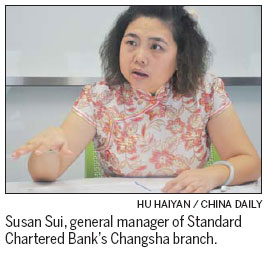The road to rebalancing
Updated: 2012-08-24 08:25
By Andrew Moody and Hu Haiyan (China Daily)
|
||||||||

A bank merely opening a new branch is not normally a significant news event. However, this month's opening by the British bank Standard Chartered of a branch in Changsha has been much heralded in the media.
The modest-looking premises in the city's New Time Plaza is seen as an indication of the business potential that now exists in China's high-growth inner regions.
Susan Sui, 41, general manager of the branch, which will employ 30 people, says the bank has wanted to open a branch in Changsha for some time. "As a foreign bank we can only open two or three branches a year, so we have to do a lot of research before we open up in any location," she says.
"We have observed the (local) government had made a lot of effort to attract foreign investment and I think more Fortune 500 companies will set up a presence here."
Sui has spent a large part of her career in the previously booming southern coastal regions. She was deputy general manager of the Guangzhou branch and regional sales manager of the bank's South China Global Enterprise. Before moving to Changsha in May, she spent five years as general manager in Zhuhai, which borders Macao.
But she believes the real growth opportunities now lie in inner regions like Changsha.
"Because of the European debt crisis and the US slowdown, the economy of the coastal regions has been affected a lot whereas in central China there is a lot more dynamism and energy to develop the economy," she says.
Another European business that opened in Changsha is Earlex, a British maker of paint spray guns, steam cleaners and other professional power tools for the DIY and professional market.
The business, based in Guildford, Surrey, which has a number of other international operations, opened a sales office in the city earlier this year. Terry Lan, 32, the sales manager, is another recruit from the south coast, having previously worked in Shenzhen.
"Changsha was chosen because the company was not that familiar with the China market and wanted a central location with easy access to other cities and where living standards and rental costs might be lower."
Lan says companies are increasingly relocating to Changsha and other areas of central China because of the new fast rail links that mean coastal cities in Guangdong are just three hours away.
But for him, there remain advantages of being located in the coastal regions, and the company will open a new office in Guangzhou next month, although keeping a base in Changsha.
"To some extent Guangdong might still be an easier place to do business because it is more developed and slightly more convenient. However we will operate from the two bases," he says.
Contact the writers through andrewmoody@chinadaily.com.cn
(China Daily 08/24/2012 page5)

 Relief reaches isolated village
Relief reaches isolated village
 Rainfall poses new threats to quake-hit region
Rainfall poses new threats to quake-hit region
 Funerals begin for Boston bombing victims
Funerals begin for Boston bombing victims
 Quake takeaway from China's Air Force
Quake takeaway from China's Air Force
 Obama celebrates young inventors at science fair
Obama celebrates young inventors at science fair
 Earth Day marked around the world
Earth Day marked around the world
 Volunteer team helping students find sense of normalcy
Volunteer team helping students find sense of normalcy
 Ethnic groups quick to join rescue efforts
Ethnic groups quick to join rescue efforts
Most Viewed
Editor's Picks

|

|

|

|

|

|
Today's Top News
Chinese fleet drives out Japan's boats from Diaoyu
Health new priority for quake zone
Inspired by Guan, more Chinese pick up golf
Russia criticizes US reports on human rights
China, ROK criticize visits to shrine
Sino-US shared interests emphasized
China 'aims to share its dream with world'
Chinese president appoints 5 new ambassadors
US Weekly

|

|






